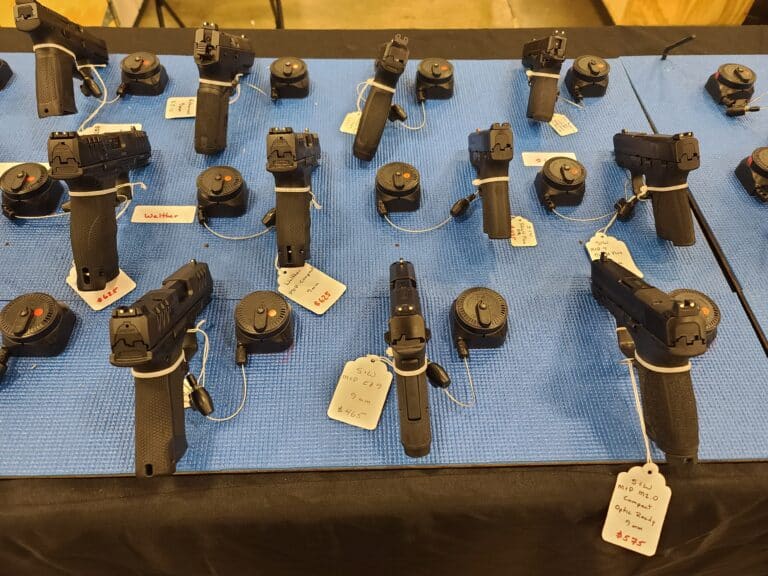Michigan policymakers have expanded state gun restrictions for violent and non-violent offenses alike.
Michigan Governor Gretchen Whitmer (D.) signed House Bill 4945, Senate Bill 471, and Senate Bill 528 into law on Monday. The trio of bills will update Michigan’s criminal sentencing guidelines to ensure that those convicted of domestic violence-related offenses, including misdemeanors, are prohibited from buying or owning firearms and ammunition for eight years after their sentence has been completed. But the bills also swept in hundreds of new offenses unrelated to domestic violence that will now cost someone their gun rights–at least temporarily.
“Keeping Michiganders – especially young women – safe and healthy is a top priority, and these bills will take long overdue steps to protect individuals from abuse,” Governor Whitmer said in a press release. “As a former prosecutor and as governor, I am proud to sign this bipartisan legislation to prevent abusers from accessing firearms.”
The newly expanded gun restrictions represent the latest fallout from the state’s recent shift in the political balance of power. Following the 2022 elections, Democrats gained unified control of the Michigan state government for the first time in nearly 40 years. The party’s lawmakers have since taken full advantage of those new narrow majorities, passing long-time gun-control priorities such as universal background checks, gun storage requirements, and a “red flag” law in the last year. The new bills add to that tally, and may not represent the end of the party’s push to restrict gun ownership in the state.
The influx of new prohibiting offenses is the result of a definitional change in one of the bills. Senate Bill 471 amends the state’s definition of a felony to include “a violation of a law of this state, or of another state, or of the United States that is punishable by imprisonment for a term exceeding one year.” That definition matches the standard that bars people from possessing guns under federal law.
However, it is more inclusive than the state’s previous definition, which only applied to crimes punishable by imprisonment for four years or more. Michigan automatically revokes the gun rights of a person convicted of felonies for a minimum of three years following the completion of their sentence and up to five years for persons convicted of “specified felonies,” which typically involve the use of force.
By reducing the threshold that triggers disarmament, the law will sweep in dozens of new non-violent and misdemeanor offenses that will temporarily suspend a person’s gun rights. According to a non-partisan legislative analysis of the bill, those include lobbying and campaign finance violations, possessing aquatic or non-aquatic prohibited species, selling a lottery ticket, writing a bad check of at least $100 in value, photographing a dead body in a human grave, practicing as a home contractor without a license, altering a reverse vending machine, and more.
Federal law already permanently prohibits someone convicted of a crime punishable by more than a year in prison, as well as those convicted of a misdemeanor domestic violence crime, from owning firearms. However, enforcement of those prohibitions often requires involvement from federal prosecutors and agencies like the Bureau of Alcohol, Tobacco, Firearms, and Explosives (ATF). Supporters of SB 471 said they aimed to give local law enforcement the tools to take more people’s guns away.
“We need to give our state level prosecutors and law enforcement the tools to enforce this kind of prohibition,” Senator Stephanie Chang (D.), the bill’s sponsor, said during its first committee hearing.
Still, adding new crimes to the list of convictions that strip somebody of their gun rights beyond those that involved domestic violence drew the ire of some Michigan Republicans.
“The Democrats drew this bill as broadly as possible to take gun rights away from as many people as possible, and then claimed it was all about domestic violence perpetrators,” State Representative Graham Filler (R.) told The Detroit News.
Working in concert with Bill 471, Senate Bill 528 amends six sections of the state’s criminal code involving breaking and entering, vulnerable adult abuse in the fourth degree, malicious destruction of property, malicious destruction of real property, stalking, and malicious use of a telecommunications service to create domestic violence subset offenses of these crimes depending on the relationship between perpetrator and victim. House Bill 4945 then amends the state’s criminal sentencing guidelines to ensure that any domestic violence conviction, whether felony or misdemeanor, is met with an eight-year suspension of gun rights.
The trio of bills comes against the backdrop of increased scrutiny over all kinds of gun restrictions in the wake of the Supreme Court’s 2022 ruling in New York State Rifle and Pistol Association v. Bruen, which set up a higher bar for the constitutionality of gun laws. The Court heard oral arguments earlier his month in United States v. Rahimi, which challenges the constitutionality of the federal gun ban for persons subject to domestic violence restraining orders. It may hear a similar case challenging the federal lifetime prohibition on gun ownership by those convicted of non-violent crimes soon because several lower courts have ruled it conflicts with the Second Amendment and the Biden Administration has already asked The Court to take up.
The Court is set to issue a ruling in Rahimi sometime before next summer.






